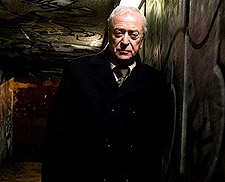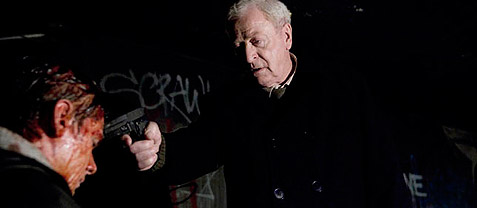
Interview Date: 04/28/2010
Run Date: 05/06/2010
Interviews Home / Movies Home / Bullz-Eye Home
If 77-year old uber-actor Michael Caine is tired of doing interviews, he hides it well. At the Regency Hotel in New York, where Caine is promoting his new vigilante film "Harry Brown," the actor seems genuinely pleased to answer any question posed. Sure, he's an actor and maybe he's perfected the veil of artifice, but for someone who has starred in over 100 films, won Academy Awards and BAFTAs and has been knighted by the Queen of England, Caine comes across as the humble guy who's "just happy to be here." We sat down with the actor to talk about vigilantes, Jack Nicholson and realizing you're too old to get the girl.
Bullz-Eye: You don't see many films that balance out a straight thriller with a social message about crime and socioeconomic conditions.
Michael Caine: Well, the whole idea was I wanted a good thriller, I wanted a good part for myself, I wanted a good script, all the normal acting things, something that people would want to see. But above and beyond that, the movie is made from a socio-political point of view as a warning to what is there and that something has got to be done about it. We got a lot of social and political criticism. The London times called us "odious."
BE: Did you expect that?
MC: Oh sure. We made the picture as a wake-up call and a warning and we hoped they would listen. And in a lot of areas, like the London Times critic, they didn't. And we went "Now what do we do?" He called it odious and it's he who's caused this smell by neglecting this strata of society and that's what we're trying to tell him: you've got to do something.
BE: But unlike Bronson in "Death Wish," you don't seem to be enjoying the killing.
MC: If you're going to make a movie about a vigilante, you've got to have a sort of military background. I know he's a silly old guy but I wanted to create someone where you say, "Don't mess with him." It wasn't vigilante as a perpetrator. He became a vigilante as victim. I wanted him to remain a victim the whole time.
BE: How much of Harry Brown was in the script and what did you want to bring to it?
MC: I wanted to bring what this neglect has done to these people. One, we got to do something about the young gangsters and two, the mayhem they have caused on the estate. I've seen documentaries recently of old ladies that pay children to do their shopping and haven't been out of their apartment for two months. It's the lowest strata of youngsters being neglected. The innocent people are being neglected. And what we're saying is, "There's never been a vigilante that went out and killed them." This is what could happen and will happen. A reporter said to me, "You ever see this movie in a public cinema?" I said, "No." He said, "When you kill those people, they cheer. Is that your intended reaction?" I said, "No, but it's proof of why we should make the movie. People are going in that direction."
BE: What about the criticism that by inflicting violence, you're perpetuating the cycle of violence?
MC: The whole point is you have to stop that cycle. It does perpetuate the cycle of violence, that's what we're saying. People who think that misread the message entirely. It's us saying, "This is what will happen if you don't do something." It's a cautionary tale.
BE: You said recently that you "push [your]self into more difficult roles." Has your decision-making process with roles changed as you get older?
 MC: For me, you have a career which goes up to being a movie star and then there came a time where I got a script and sent it back and said to the producer, "The part's too small." He sent it back and said "I didn't want you to read [the part of] 'The Lover,' you were supposed to read 'The Father.'" I went, "Oh shit." And I looked in the mirror and went, "Oh yeah yeah. The only girl I'm ever going to kiss in a movie is my daughter." Instead of getting the girl, I now get the part. And occasionally I'll get the ulcer. I obviously don't have to work now to pay the rent or the phone bill, so I just sit there now and I wait for an offer I can't refuse – the offer being the script, not the money—and this was something I couldn't refuse.
MC: For me, you have a career which goes up to being a movie star and then there came a time where I got a script and sent it back and said to the producer, "The part's too small." He sent it back and said "I didn't want you to read [the part of] 'The Lover,' you were supposed to read 'The Father.'" I went, "Oh shit." And I looked in the mirror and went, "Oh yeah yeah. The only girl I'm ever going to kiss in a movie is my daughter." Instead of getting the girl, I now get the part. And occasionally I'll get the ulcer. I obviously don't have to work now to pay the rent or the phone bill, so I just sit there now and I wait for an offer I can't refuse – the offer being the script, not the money—and this was something I couldn't refuse.
BE: At what point did you feel you were in a comfortable spot where you said, "I can pick whatever I want"?
MC: There was an epiphany with that producer and that script when he asked me to play the father. I sent the script back and said I didn't want to do any movies at all. So I stopped. It was Jack Nicholson who brought me out of it. We were in Miami and suddenly he was about to do [the 1996 noir] "Blood and Wine" and said, "Why don't you do this with me?" It was him who restored my faith in the business.
BE: Did he say anything to you specifically?
MC: Nothing. It's just who he is. He's Jack.
BE: As a former soldier, how much of your personal military experience did you bring to the film?
MC: I knew what Harry Brown could do because I've been there myself. I wasn't a Marine though. I was a professional coward. I won a medal for cowardice as a matter of fact [laughs].
BE: Not exactly the Purple Heart.
MC: No, it's a pair of running shoes [laughs]. But for me, I understood. When you get a part as an actor, you start researching. How would his hair be? What sort of clothes would he wear? Has he got a moustache? I had been researching this part unknowingly all my life. I knew exactly who he was. I just had to get into the actual character of him. But I knew how he thought.
BE: You always hear the cliché about the part the "actor had been waiting for all his life."
MC: Yeah, but in a funny way, it was for me. But I still find parts. I've been reading a book for my own amusement and I went, "Jesus Christ, I've never done this before in my life but I must ring my agent and see who owns this book." I can't tell you the name though. But the first scripts I turn down is the old guy who's crumbling and dies. I don't want to play that anymore. I want to be the empowered old man who gets up and does something.
BE: Do you feel any personal sympathy for Harry Brown?
MC: Oh, I'm a completely non-violent man.
BE: So you could never do what HB does?
MC: Not in general, but I am a very family-oriented man so maybe then, that might be a different story. But most soldiers are completely anti-war, anti-violent people. My view of war is it's always declared by men who are too old to go. Remember that.
Later that day, we sat in on a roundtable discussion with Caine and other journalists, where he talked more in-depth about the escalating crime in England and playing the role of a bad-ass vigilante.
Journalist #1: There seemed to be something very connecting about the story for you.
Michael Caine: There was very much a connection with it. I came from a gang background and where they actually shot the movie was in the very place that I came from. We got bombed out at the end of the war and they got these plastic houses in a box and they put them up pretty quickly. In those apartments on the wall is a plaque with me on it and Charlie Chaplin. This story, when I got it, was written by a guy in Newcastle. But you could just go from any of those projects in England, it would be the same. All you have to do is change the accent. So I thought I knew what it was like until I actually went back for a couple of months shooting at night. Although I was in a gang, these gangs now made us look like Mary Poppins. Our gang was for self-protection. The drug was alcohol and the weapon was our fists. When I went back now, there's a lot of killings with guns and knives. I made the movie, partly, as a wake-up call and if you don't do something about it, this is what will happen.
J2: The villains in this, their own mothers would kill them. They're so bad.
MC: Several of the reviews said that we'd exaggerated but in our research, there were things we couldn't film because we said no one would believe this is happening. The most extreme scene is when two drug dealers were selling a girl. That's very commonplace.
J3: How were you attacked politically?
MC: We were attacked by socialist press because there was an implied criticism in as much that this was working class people and they had been in power for 12 years. We didn't blame anybody. We just said, "Have a look at this. If you don't do something, something else will happen."
J2: You've never done anything this violent before.
MC: No. In England, there's never been a world this violent. I've played a killer but there's never been a Harry Brown who's shot a load of boys that shot his best friend. The reason he's there is because if you don't do something, there will be. There's been vigilantes before, like "Death Wish" but he played a vigilante as a guy enjoying himself as a perpetrator. I always played Harry as a victim. It was a justice suicide. He's lost his best friend, his wife and he had emphysema so if he got killed doing this, it didn't matter.
J4: When America looks at Britain on film, it's almost picture postcards. Do you think this film will change that?
MC: No, the picture postcards are still there. It's not really dangerous unless you go to [the projects]. I think you have to deal with reality sometimes. And the reality is so personal because I spent two months at night in that area and a lot of the gang boys were in the movie so I sat talking to them for hours. The sum total of what I got out of them is they all felt that they never had a chance. And I've felt that you have had a chance, but you blew it. I felt they needed a second chance. You cannot leave them there to rot.
J2: Do you think you could have been Harry had you had the opportunity? Could you have turned out like this guy?
MC: No, I don't think so. Harry Brown was ambitionless and content to just go down to the pub, but I understood all his surroundings. I knew this part more than the writer.
J5: About the mural you were speaking about, I've read before that it hasn't been defaced even though it's surrounded by many gangs.
MC: Yeah, that's what's amazing to me. That mural has been up there for several years and it's never been touched. It's big [holds hands wide] also. There's also a painting of a photograph of my mother giving me a cup of tea that they took from a newspaper. I said, "Who painted this? Can I buy it?" No one knows. They just put it up.

J6: Did the film leave the neighborhood better off or was that just a fantasy?
MC: In the real neighborhood, those buildings are coming down as we speak. I asked a counselor, "When you take these people out of here, where do you put them?" He said, "As far away from each other as possible in order to break up the gangs." It was interesting that they're pulling them down in favor of luxury flats but there are eight floors in those luxury flats for affordable housing [for middle-class]. I've never seen that in my life.
J1: In your last film, you mentioned your wife and daughter were concerned about the role of Clarence in "Is Anybody There?"I wonder how they took all the violence and physicality in this role.
MC: My wife hates violent films but my oldest daughter loves them. They had a showing for me and I said, "You walk out the minute you want to and I'll come with you." She sat the whole way through it. She said, "I didn't enjoy it because it's not a film you 'enjoy' but I liked what it was."
J1: Did you have any hesitation when you read the script and saw how brutal it was?
MC: No. If it had been a film like "Death Wish," which was a violent film, that's different. This was a film about violence; about an innocent man who is mainly a victim of the entire system.
J5: I know you have strong opinions about bringing the draft to the UK. Did you have these opinions before the film?
MC: I spent six months learning to defend my country and becoming an actual part of it. It's too corny to say, but you feel then that you belong because you've done your bit and you're here to defend it. I defended it in Korea. My whole gang went in the Army and came out different from when we came in. Though in some ways, the same.
J1: Do you think this will be your last starring role?
MC: No, no. It's not. For a long time, I regarded myself as retired unless I get a script that I absolutely can't refuse. But I said before, and it's changed recently, that I just sit there and wait and if no script turns up that I wanted to do, the movie business retires you. You don't retire from the movie business. Now, I'm finishing my autobiography and then I have no idea what's next.
You can follow us on Twitter and Facebook for content updates. Also, sign up for our email list for weekly updates and check us out on Google+ as well.











